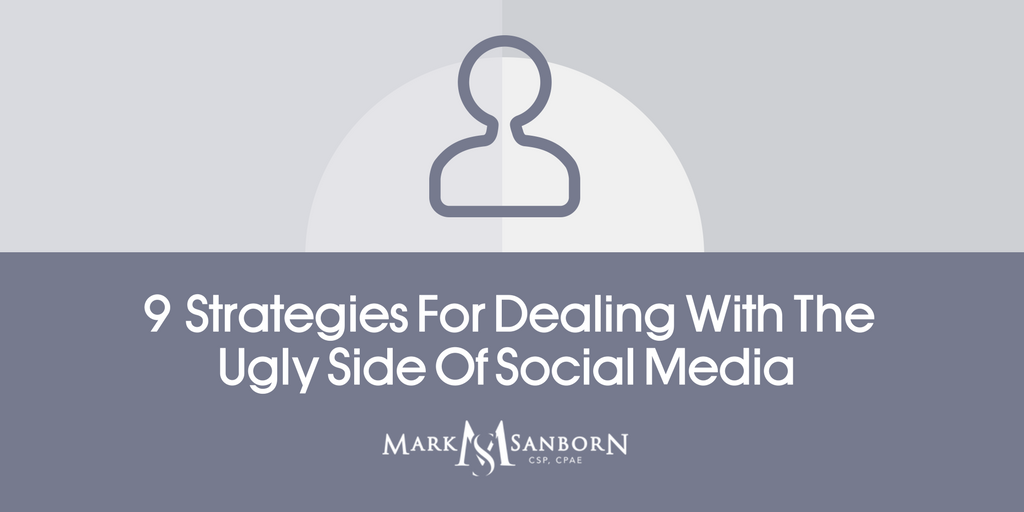Social media has become a true amplifier, permeating every nook and cranny of the web; giving a megaphone to those who might have previously found themselves  voiceless. While I generally believe that the proliferation of the social web is a good thing, it does have a dark side that is difficult, if not impossible to ignore.
voiceless. While I generally believe that the proliferation of the social web is a good thing, it does have a dark side that is difficult, if not impossible to ignore.
I was reminded of this recently when an unscrupulous competitor accused me and my friend Larry Winget of an ugly racial slur. While it was totally fabricated, this person willfully resorted to defamation of character to defend his indefensible behavior.
It is easy to get mad, get on your computer, and allow emotions to run amok. We live in a world where you can say or write literally whatever you want and almost immediately find some captive audience just waiting to react.
Yet there are situations where you do need to respond to the detractors, and take some risks in the pursuit of truth, honesty and justice. I can’t tell you exactly when to do that (that is your decision), or precisely how to react. But I do believe, as does Larry, that there are times you shouldn’t acquiesce to digital bullies. You need to take a stand.
Taking a stand is not risk free, but the greater risk is how you respond to the ludicrous, the fabricated and the unfair. An ongoing challenge of leadership is the control of ones’ emotions and actions. In the age of the digital echo chamber, how do you guard yourself from having an unprofessional moment, and perhaps more importantly, how do you keep from throwing fuel on a fire you’d rather put out?
Here are a few tips on how to keep your social media actions in check, and how to react to others who just can’t seem to control theirs:
How do I think through my social media actions in a heated moment?
- If you wouldn’t say it to your grandmother, don’t write it on Twitter. The oldest test in the book is the grandma test. It still holds today. If she would be appalled, odds are that others will be too. It feels good to blast an opponent, but such outburst can easily be used against you.
- Remember that everything that you say or do on the web is archived. Even if the NSA happens to miss it, odds are that Twitter, Facebook, Google, and/or other platforms have a way of archiving the information. Consider everything you write these days on the internet to be permanent. Trolls may delete their comments but they still leave a trail.
- Still debating saying it? Sleep on it. This is familiar but often good advice. If you really feel the need to say something that might be taken the wrong way, consider sitting on it overnight. Waiting until the next day will rarely hurt your point, and it may save huge amounts of embarrassment.
- If you do say it…make sure you feel that you could defend it in a court of law. Falsely accusing someone of something is a big deal and the repercussions could amplify beyond your original intentions.
- Remember that your reputation is cumulative. How you respond to the unfair and uncivil will either enhance or detract from your reputation. Don’t let others bait you into ruining your reputation.
How do I react when I am targeted on social media?
- Grab screenshots. If someone truly is going after you, the first move is to gather evidence. Make sure that you have copies. Odds are that they will quickly realize what they have done and will try to erase their trail, so the best thing you can do is make sure you have a copy on hand.
- Report them. Twitter, LinkedIn, Facebook, and most other platforms have guards against those who harass others. Don’t hesitate to put in a report – that’s why it’s there!
- Try not to react. This goes back to my above points about guarding yourself. As hard as it is, try to remember that once integrity is lost it is extremely hard to recover. The more reaction, the more fuel you pour on the fire.
- Remember that the truth is the best defense. As someone who has been egregiously accused of something I did not do, I took solace in the fact that I was innocent and as such the accusation cruelly asserted could never be proven.
We live in a world where unscrupulous people have migrated to online communities and live among the rest of us. I hope you never have to use the above actions, but that when you do I hope they serve you well.









Wow Mark! I thought I was the only person who had “The Granny Rule!!” If you wouldn’t want your granny to see you/hear you say it or do it then you probably shouldn’t either. Good advice.
Your advice is so classy — as I would expect from you since you are a class act.
It is hard to take the high road when someone has wrongly accused you of something, but you have. It’s a great reminder to let the emotions cool off and take appropriate action, legal or reporting someone to other authorities. Thanks for being a great role model on this.
It’s good to remember that almost everything you write goes into the public domain. If you want things to remain private, send a private message; however, don’t forget that private messages need to follow the above rules as much as public ones do. When in doubt, don’t write anything at all. If the friendship of the person who offended you is really important, you’ll tell them in person.
Wise words we can all use. Thanks for being the class act you are!!
Found this at a great time. Thank you Mark!